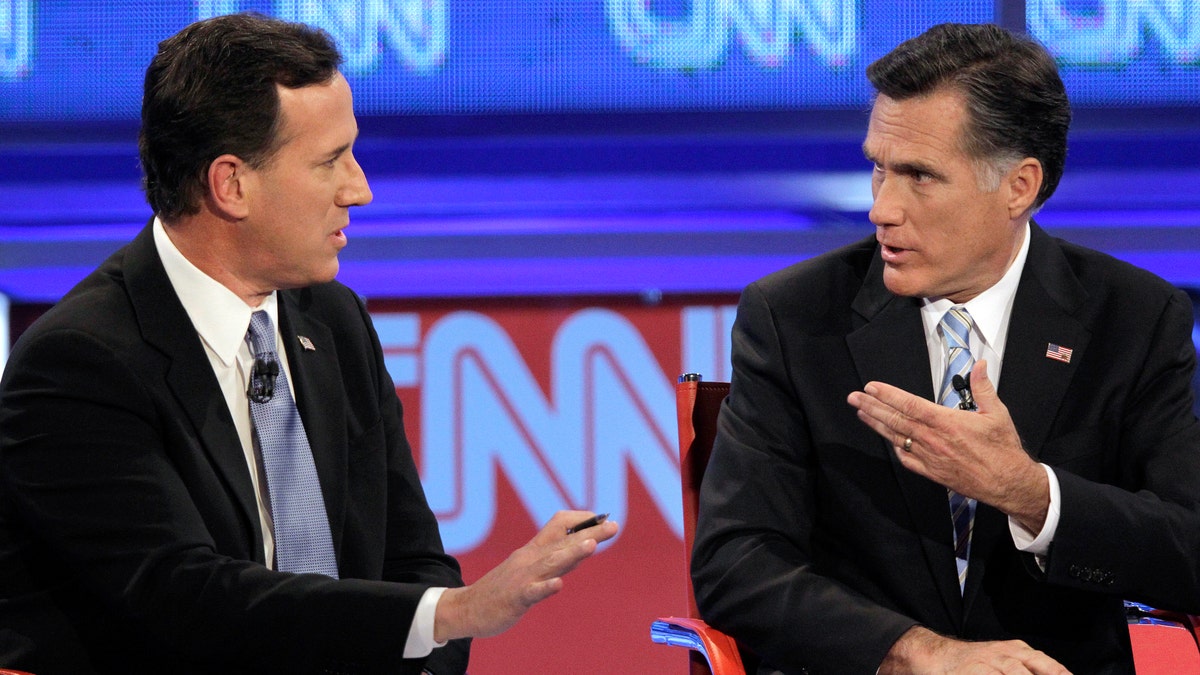
Republican presidential candidate, former Massachusetts Gov. Mitt Romney, right, debate a point with former Pennsylvania Sen. Rick Santorum during a Republican presidential debate Wednesday, Feb. 22, 2012, in Mesa, Ariz. (AP Photo/Jae C. Hong) (AP2012)
Facing off in the state that pioneered a recent turn toward local enforcement of federal immigration law, Republican presidential candidates vowed to do more to combat illegal immigration at Wednesday’s primary debate in Mesa, Arizona.
Former Massachusetts Governor Mitt Romney said he looked to Arizona’s controversial approach to immigration as a model. If elected, Romney said he would suspend federal lawsuits against state laws such as Arizona’s SB 1070.
Romney also voiced support for building a wall on the U.S.-Mexican border and mandating the use of E-Verify to deter undocumented immigrants from finding employment.
Newt Gingrich said he would devote as many resources as necessary to securing the United States’ southern border, including the construction of a double fence and the deployment of thousands more Homeland Security Department employees to border areas.
Libertarian Ron Paul dismissed the idea of a border wall, calling it a waste of taxpayer money, but said the problem of undocumented immigrants receiving government benefits must be addressed.
Rick Santorum also said he would beef up efforts to combat illegal immigration.
Immigration Hawk Santorum Closes in on Romney in Michigan & Arizona Polls
While the candidates generally agreed when it came to immigration, Mitt Romney and Rick Santorum traded fiery accusations about health care, spending earmarks and federal bailouts.
With pivotal primaries in Arizona and Michigan just six days distant — and 10 more contests one week later — Romney and Santorum sparred more aggressively than in past debates, sometimes talking over each other's answers.
Texas Rep. Ron Paul chimed in from the side, saying with a smile that Santorum was a fake conservative who had voted for programs that he now says he wants to repeal. Former House Speaker Newt Gingrich acted almost as a referee at times.
On foreign affairs, all four Republicans attacked President Barack Obama for his handling of Iran and its attempt to develop a nuclear program, but none of the contenders advocated providing arms to the rebels trying to topple the government of Syrian President Bashar Assad.
The most animated clash of the evening focused on health care in the United States.
Santorum said that Romney had used government money to "fund a federal takeover of health care in Massachusetts," a reference to the state law that was enacted during Romney's term as governor. The law includes a requirement for individuals to purchase coverage that is similar to the one in Obama's landmark federal law that Romney and other Republicans have vowed to repeal.
In rebuttal, Romney said Santorum, a former Pennsylvania senator, actually bore responsibility for passage of the health care law that Obama won from a Democratic-controlled Congress in 2010, even though he wasn't in office at the time. Romney said that in a primary battle in 2004, Santorum had supported then-Sen. Arlen Specter of Pennsylvania, who later switched parties and voted for the law Obama wanted.
"He voted for Obamacare. If you had not supported him, if we had said no to Arlen Specter, we would not have Obamacare," Romney contended.
Santorum was the aggressor on bailouts.
While all four of the Republicans on the debate stage opposed the federal bailout of the auto industry in 2008 and 2009, Santorum said he had voted against other government-funded rescue efforts.
"With respect to Governor Romney that was not the case, he supported the folks on Wall Street and bailed out Wall Street — was all for it — and when it came to the auto workers and the folks in Detroit, he said no. That to me is not a principled consistent position," he said.
An Associated Press-Gfk poll released Wednesday found that Obama would defeat any of the four remaining Republican contenders in a hypothetical matchup. It also found that the nation is showing more optimism about the state of the economy, the dominant issue in the race.
But for two hours, Romney, Santorum, Paul and Gingrich had a different campaign in mind, their own race for the Republican nomination and the right to oppose Obama in the fall.
After a brief lull, the campaign calendar calls for 13 primaries and caucuses between next Tuesday, when Arizona and Michigan have primaries, and March 6, a 10-state Super Tuesday.
Wednesday’s debate – the twentieth of the GOP primary race – may be the last before Republicans select a candidate to face Barack Obama.
Based on reporting by the Associated Press.
Follow us on twitter.com/foxnewslatino
Like us at facebook.com/foxnewslatino












































